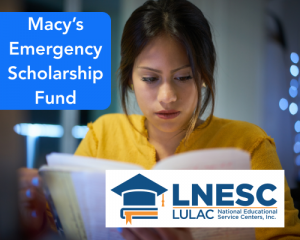

By Gabriel Jimenez-Ekman

Gabriel Jimenez-Ekman is a content editor and writer at Scholarships360. He has managed communications and written content for a diverse array of organizations, including a farmer’s market, a concert venue, a student farm, an environmental NGO, and a PR agency. Gabriel graduated from Kenyon College with a degree in sociology.
Edited by Maria Geiger
Maria Geiger is Director of Content at Scholarships360. She is a former online educational technology instructor and adjunct writing instructor. In addition to education reform, Maria’s interests include viewpoint diversity, blended/flipped learning, digital communication, and integrating media/web tools into the curriculum to better facilitate student engagement. Maria earned both a B.A. and an M.A. in English Literature from Monmouth University, an M. Ed. in Education from Monmouth University, and a Virtual Online Teaching Certificate (VOLT) from the University of Pennsylvania.
Updated: September 3rd, 2024
The Bright Futures program is an amazing opportunity for Florida residents to earn funding for college. But in addition to being a high-paying opportunity, it is very competitive and has a strict set of requirements.
The requirements outlined in the Bright Futures handbook can be overwhelming, and may deter students from applying. So, we’ve done the hard work for you, and made the requirements more readable! Read on to learn all about the Bright Futures scholarship requirements.
Each Bright Futures program has a different set of requirements, but there are a few that they all share. Here are the requirements you must meet in order to qualify for any Bright Futures program. You must:
Apply to these scholarships due soon










If you meet all the requirements listed above, congratulations! You may be in the running for a Bright Futures scholarship. Our next step will be to provide an overview of each Bright Futures program. We’ll show you what the award amounts are, and what educational tracks they are meant for. Once you find the right fits for you, read on to learn about each program’s requirements.
The Florida Academic Scholars program provides 100% of funding for a public program of study. This includes all applicable tuition and fees. Students who choose a private institution will receive a comparable award but it may not cover the entire cost. Winners also receive $300 per semester for additional educational costs. This is the most competitive Bright Futures program and has the highest requirements.
Students must earn the required volunteer service hours, work hours or a combination that totals a minimum of 100 hours
The Florida Medallion Scholars program provides 75% of funding for a public program of study. This includes 75% of all applicable tuition and fees. Students who choose a private institution will receive a comparable award but it may not cover the entire 75%. This program is less competitive than the Florida Academic Scholars program. So, if you don’t qualify for Florida Academic Scholars, you may still be able to cover 75% of your costs.
Students must earn the required volunteer service hours, work hours or a combination that totals a minimum of 100 hours
Students can use Bright Futures scholarships at both public and qualifying private Florida institutions.
The Florida Gold Seal CAPE Scholars program provides a fixed payment per credit hour which varies with program of study. The program is designed for students who already received an Associate’s Degre e and are seeking a Bachelor’s . This program is less competitive than Florida Medallion Scholars and Florida Medallion Scholars. Its GPA and test score requirements are less strict.
The Florida Gold Seal CAPE Scholars program provides a fixed payment per credit hour which varies with program of study. This program is designed for students who are pursuing a certificate or vocational degree . It has lower GPA and test score requirements than Florida Academic Scholars and Florida Medallion Scholars.
Now, let’s dig into the requirements for each program. This will help you decide which award you’ll have the best shot at obtaining.
Florida Academic Scholars must hold a minimum 3.5 weighted GPA. Additionally, they must obtain a minimum score of 29 on the ACT , a 95 on the CLT (Classic Learning Test), or 1330 on the SAT . They must also complete at least 100 service hours or 100 paid work hours.
Students must also have completed a set of high school coursework requirements . However, these requirements align with the state university system admission requirements. As a result, any student considered for admission at a Florida school would meet these requirements.
Florida Medallion Scholars must hold a minimum 3.0 weighted GPA. Additionally, they must obtain a minimum score of 24 on the ACT, an 82 on the CLT, or 1190 on the SAT. They must also complete at least 75 service hours, 100 paid work hours, or a sum of paid and service hours to equal 100 or more.
Students must be pursuing an applied technology diploma, an associate’s degree in applied science or associate in science, or a career certificate. If students have already received an associate’s degree, they can receive funding for up to 60 hours towards a Bachelor’s. Florida high school students who wish to qualify for the GSC must meet the following criteria:
Students who meet general Bright Futures requirements and are currently enrolled in a career education or certificate program are eligible. High school students planning on enrolling in a career education or certificate program are eligible if they meet these requirements:
100% of tuition and fees at all public Florida institution or a comparable amount at private institutions
75% of tuition and fees at all public Florida institutions or a comparable amount at private institutions
Students who don’t meet the test requirements listed above may still be eligible for the FAS or FMS. If you received any of the following awards, you are exempt from testing requirements:
Students who have been receiving Bright Futures’s funds throughout the academic year do not need to re-apply and rather will be automatically evaluated at the end of the spring term. In order to be automatically renewed, you must meet a minimum cumulative GPA which ranges depending on the program you are a part of.
It is important to note that if you do not meet the minimum credit hours requirement and the minimum GPA requirement you will be unable to continue or re-apply for a Bright Futures program. So, be sure that you are on your A-game if granted a Bright Futures scholarship!
Here are the minimum requirements for GPA for the following programs:
You can use Bright Futures at any approved program in the state of Florida, public or private . This also includes community colleges . Here is a sampling of some schools that you can use the scholarship funds at. For a more extensive list, check out our full list of the top Florida colleges .
If you are pursuing a Bright Futures scholarship, there are many ways that you can maximize your chances. You can start by working to make sure your test scores and GPA are as high as possible. You can maximize your test scores by deciding whether to focus on the SAT or the ACT . It’s also important to choose the right tutor and determine the best time to take these tests .
You’ll also want to ensure that you fill out the Florida Financial Aid Application before the deadline. Remember, that deadline is August 31 of your graduation year. Also, don’t put all your eggs in one basket. Look around for other scholarships, and apply far and wide! The more opportunities you apply to, the higher a chance you’ll receive one.
To earn the Bright Futures Florida Academic Scholars award, you’ll need a minimum of 1330 on the SAT, a minimum of 29 on the ACT, or a minimum of 95 on the CLT. The Florida Medallion Scholars program, on the other hand, requires a minimum of 1190 on the SAT, a minimum of 82 on the CLT, or a minimum of 24 on the ACT. The Florida Gold Seal CAPE Scholars program has no SAT requirement, and the Florida Gold Seal Vocational Scholars program has varying minimum SAT scores for the different awards.
Each Bright Futures scholarship has a different minimum ACT score, and each can be substituted for a qualifying SAT score if applicable. The Florida Academic Scholars award requires a minimum of 29 on the ACT, while the Florida Medallion Scholars program requires a minimum 24. Gold Seal CAPE Scholars have no minimum ACT score, and minimum scores vary by the different levels of Gold Seal Vocational Scholars.
Students who engage in a military, religious, or service obligation can defer the Bright Futures Scholarship as long as the obligation lasts longer than 18 months. The five-year period for the scholarship will begin after the obligation is complete, unless the student has already received the first disbursement, in which case the five-year period will remain unchanged.
If you are a Florida resident who went to school out-of-state, you can still earn a Bright Futures scholarship if you meet certain requirements. In order to qualify, you must have attended an out-of-state school because your parents were under a military or public service obligation that caused them to move temporarily out-of-state.
To earn a Bright Futures scholarship, students have to be enrolled in at least 6 credit hours per semester. This is equivalent to being enrolled half-time. Full-time enrollment would be 12 credit hours. So, as long as you enrolled for half the credits of what your institution considers full-time, you can qualify for the scholarship.
You can use Bright Futures scholarships at any approved program in the state of Florida, public or private. That includes the University of Florida , Florida State , University of South Florida , University of Miami , and many more.
Yes! Students attending a private college or university in Florida are eligible to use Bright Futures to help pay for their school. As long as it is on their list of approved programs, it doesn’t matter whether the school you choose is public or private. However, the award may not cover your entire cost of tuition at a private school. Bright Futures offers “comparable awards” to private school attendees, meaning it will be a similar cash value to full tuition at a public school. Since private schools tend to have higher tuition, there is typically more of a gap.